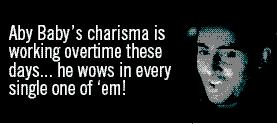
Though the last commercial evoked a somewhat- mixed reaction for not displaying the features of the car itself, instead simply creating an aura of ‘refined excitement’ around the brand, it nonetheless was highly appreciated for its slick storyboard! In the latest commercial from the Fiesta stable, the mood is decadent, with uber-cool Abhishek in typical holiday spirit, as he spins the car keys over the Indian map to finalise a destination where he and his coterie of friends will head. The destination they finally hit upon is Goa, and while his pals fancy the aerial route to get there, the Bollywood dude announces it’s going be the train, to everyone’s amazement.
For Complete IIPM - Article, Click on IIPM-Editorial Link
Source:- IIPM-Business and Economy, Initiative:- Prof. Arindam Chaudhuri - 2006
For Complete IIPM - Article, Click on IIPM-Editorial Link
Source:- IIPM-Business and Economy, Initiative:- Prof. Arindam Chaudhuri - 2006


